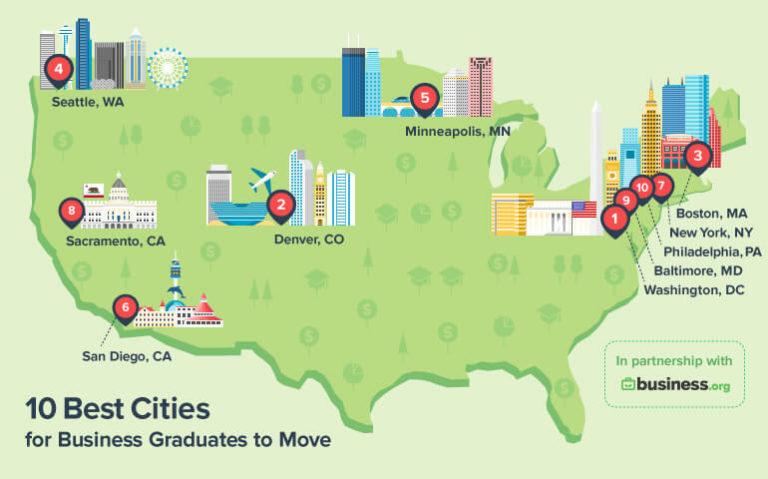Leading U.S. Cities Empowering Entrepreneurial Success in 2024
America’s Premier Startup Ecosystems: Where Innovation Flourishes
In today’s fast-evolving American business environment, the city an entrepreneur selects can significantly influence their venture’s trajectory. As startups continue to redefine economic landscapes, several U.S. cities have distinguished themselves as epicenters of innovation, investment, and entrepreneurial growth. This analysis highlights the top metropolitan areas fostering startup success, examining critical aspects such as funding accessibility, talent availability, living expenses, and overall lifestyle quality. From long-established technology powerhouses to rapidly expanding urban centers, we explore the unique attributes that make these cities magnets for visionary founders.
Key U.S. Cities Catalyzing Startup Expansion and Innovation
Across the nation, certain cities have cultivated thriving entrepreneurial ecosystems by combining advanced infrastructure with vibrant, collaborative communities. Silicon Valley continues to dominate as a global technology nucleus, boasting a dense network of venture capital firms and industry leaders that attract top-tier talent worldwide. Meanwhile, cities like Austin and Seattle have experienced remarkable growth, propelled by burgeoning tech scenes intertwined with creative and cultural industries. These environments not only provide abundant opportunities but also foster a spirit of cooperation that accelerates startup development at every phase.
Noteworthy entrepreneurial hotspots include:
- Boston, Massachusetts: A biotech powerhouse supported by prestigious universities and research institutions.
- Denver, Colorado: Emerging as a leader in sustainable technologies and outdoor lifestyle enterprises.
- New York City, New York: A global financial center rapidly advancing fintech innovations and diverse commercial ventures.
- Raleigh, North Carolina: Known for its Research Triangle Park and affordable living, attracting a youthful entrepreneurial demographic.
| City | Dominant Industry | Startup Concentration |
|---|---|---|
| San Francisco | Technology & Software Development | Very High |
| Austin | Technology & Creative Media | High |
| Boston | Biotechnology & Higher Education | Moderate |
| Denver | Green Technology & Outdoor Recreation | Moderate |
Critical Drivers Behind Entrepreneurial Hotspots
The rise of entrepreneurial activity in these leading cities stems from a combination of strong infrastructure, abundant capital, and dynamic networking opportunities. Urban centers that invest in co-working environments, startup incubators, and accelerators create fertile grounds for innovation and business scaling. Additionally, access to a skilled workforce‚ÄĒoften nurtured by top-tier universities and research hubs‚ÄĒensures a steady influx of fresh ideas and expertise essential for sustained growth.
Fundamental factors fueling these cities’ appeal to entrepreneurs include:
- Balanced cost of living that maintains affordability without sacrificing lifestyle quality
- Robust venture capital ecosystems providing critical funding channels
- Economic diversity encouraging cross-sector collaboration and innovation
- Proactive local government policies offering tax benefits and simplified regulations
- Vibrant cultural scenes attracting creative and motivated professionals
| Factor | Benefit to Entrepreneurs |
|---|---|
| Capital Availability | Facilitates startup financing and expansion |
| Talent Access | Ensures a skilled and innovative workforce |
| Infrastructure | Enhances operational capabilities and efficiency |
| Government Incentives | Reduces regulatory hurdles and operational costs |
| Networking Opportunities | Encourages partnerships, mentorship, and knowledge sharing |
Balancing Living Costs with Venture Capital Access in Top Startup Cities
For entrepreneurs, finding the right equilibrium between affordable living and access to investment is paramount. San Francisco and New York City remain dominant in venture capital inflows, collectively attracting over $27 billion in funding in 2023 alone. However, these cities‚Äô high living expenses‚ÄĒaverage monthly rents exceeding $3,500‚ÄĒpose significant financial challenges for early-stage startups. In contrast, cities like Austin and Denver offer more economical living costs, with rents averaging around $1,650, while still providing growing venture capital networks and supportive startup amenities. This balance allows founders to extend their operational runway without sacrificing access to critical resources.
| City | Average Monthly Rent (2024) | Venture Capital Raised (2023) | Startup Support Features |
|---|---|---|---|
| San Francisco | $3,850 | $15.5B+ | Incubators, Accelerators, Extensive Networking Events |
| New York City | $3,250 | $12.3B+ | Co-working Spaces, Industry Conferences, Investor Forums |
| Austin | $1,700 | $3.2B+ | Co-working Hubs, Tech Meetups, State Incentives |
| Denver | $1,600 | $1.1B+ | Incubators, Business Grants, Networking Groups |
These figures underscore the trade-offs entrepreneurs face: opting for high-cost, capital-rich environments or choosing emerging markets that offer affordability alongside growing investment opportunities. Strategic decisions in this regard can significantly influence startup longevity and scalability.
Emerging Markets: Sectoral Strengths and Entrepreneurial Triumphs
Beyond the U.S., emerging global markets are experiencing a surge in startup success, driven by sector-specific growth aligned with global trends. Regions such as Southeast Asia, Latin America, and Africa are becoming hotspots for innovation, particularly in sectors like renewable energy, mobile commerce, and agricultural technology. These areas benefit from youthful demographics, increasing digital penetration, and supportive government policies, creating fertile environments for entrepreneurs to thrive.
| Region | Leading Industry | Growth Catalysts |
|---|---|---|
| Southeast Asia | E-Commerce & Fintech | Expanding smartphone use, rising middle-class incomes |
| Latin America | Mobile Payments & Agritech | Financial inclusion initiatives, agricultural innovation |
| Africa | Renewable Energy & Health Technology | Energy access programs, healthcare tech startups |
- Government initiatives are instrumental in fostering startup ecosystems through incentives and regulatory reforms.
- Investment flows into these regions are increasing, with more venture capital funds targeting emerging market startups.
- Collaborative communities enhance knowledge sharing and mentorship, boosting entrepreneurial success rates.
Final Thoughts: Navigating the Entrepreneurial Landscape
As the startup ecosystem continues to evolve, selecting the ideal city remains a pivotal decision for entrepreneurs. Whether launching a cutting-edge tech company in San Francisco or capitalizing on affordable growth opportunities in Austin, understanding the unique advantages and challenges of each environment is essential. By staying informed about funding trends, talent availability, and living costs, founders can strategically position their ventures for sustainable success in an increasingly competitive marketplace.







